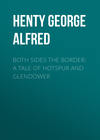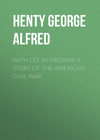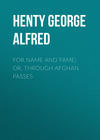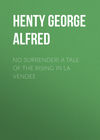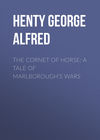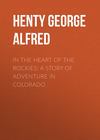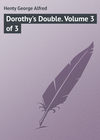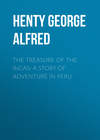Czytaj książkę: «Both Sides the Border: A Tale of Hotspur and Glendower», strona 10
"Face round!" Oswald shouted. "Now, men, lay about you.
"A Percy! A Percy!"
The active little horses swung round instantly, and faced the crowd surging up against them. This was the style of fighting to which the border men were accustomed. Active as the Welsh were, the border ponies were as quick in their movements, wheeling and turning hither and thither, but keeping ever within a short distance of each other. The troopers hewed down the foe with their heavy swords; and, being partly protected by their armour, they possessed a great advantage over their opponents.
Oswald and his uncle fought slightly in advance of the others, lending a helping hand to each other, when the pressure was greatest. On one occasion a Welshman seized Alwyn's leg, while he was engaged with a foeman on the other side, and strove to throw him from his horse. Oswald wheeled his pony, and with a sweeping blow rid his uncle of his foe; but, at the same moment, a man leapt up behind him, while two others assailed him in front.
The Welshman's sinewy arms prevented him from again raising his sword, and he would have been slain by those in front, had he not, at the moment, slipped his right foot from his stirrup and thrown himself from his horse, his leg sweeping off the man who held him behind, and hurled him to the ground beneath him.
The Welshman's grasp instantly relaxed; but, as Oswald tried to rise, a blow fell upon his helmet, and four Welshmen threw themselves upon him. He threw his arms around two of them, and rolled over and over with them, thereby frustrating the efforts of their companions to strike or stab him, through some unguarded point in his armour; when suddenly there was a mighty shout, two tremendous blows were struck in quick succession, then there was a shout, "Hold them still, Master Oswald, hold them still!"
Oswald tightened his grasp on his assailants, who were now striving to rise. There was another crashing blow, and then his last opponent slipped from his grasp, and fled.
"Thanks, Roger," he said, as he leapt to his feet, "you were but just in time; another minute, and those fellows would have got their knives into me."
"I have had my eye upon you, master, all the time; and while doing a little on my own account, have kept myself in readiness to come to your aid, if need be."
Roger was fighting with a heavy mace, and the number of men lying round, with their skulls crushed in, showed with what terrible effect he had been using it. Oswald again leapt on to his horse, which had been too well trained to leave his master's side; and had indeed in no small degree aided him, by kicking furiously at the Welsh, as they strove to aid their comrades on the ground.
By this time the combat was well-nigh over. The protection afforded by Alwyn's band, against any attack on their rear, had enabled Sir John's men-at-arms and the tenants to clear the street in front of them; but the Welsh, though unable to hold their own in open fight, had now betaken themselves to their bows and arrows, and from behind every house shot fast.
The door of the house that had still resisted had been thrown open, and eight men had come out, followed by some twenty women and children.
"Do each of you leap up behind one of us!" Sir John shouted.
"Help the women up, men, then right-about, and ride out of the village. It is getting too hot for us, here."
The order was quickly obeyed and, placing the horses carrying a double burden in the centre, the troop rode out in a compact body. The Welsh poured out into the road behind them.
"Level your spears!" Alwyn shouted to his men; who had, by his orders, fallen in in the rear of the others.
The long spears were levelled and, with a shout, the twenty men rode down on their pursuers, bursting their way through them as if they had been but a crowd of lay figures; then, wheeling, they returned again, none venturing to try to hinder them, and rejoined the main body.
"Well done, indeed!" Sir John Burgon exclaimed, "and in knightly fashion. Verily, those long border spears of yours are right good weapons, when so stoutly used."
Once outside the village, the troop rode quietly on to the spot at which they had first charged. Then the villagers dismounted.
"You made a stout defence, men," Sir John said. "It was well that you had time to gain that house."
"It was agreed that all should take to it, Sir Knight," one of the men said; "but the attack was so sudden that only we, and these women, had time to reach it before they were on us; and, had it not been for your arrival, they must soon have mastered us, for they were bringing up a tree to burst in the door; and as none of us had time to catch up our bows and arrows, we had no way of hindering them. Still, methinks many would have fallen, before they forced their way in."
The men now fell in again. Their numbers were counted. The losses were by far the heaviest in the front line. Five of the castle men-at-arms, and fourteen of the levy were killed. Several others had gashes from the long knives and light axes of the Welsh. Five of the tenants in the second line had fallen, but none of Alwyn's band, although most of the latter had received wounds, more or less serious, in their combat with the Welsh.
"The loss is heavy," Sir John said, "but it is as nought to that inflicted upon the Welsh. I did not count them, as we rode back, but assuredly over a hundred have fallen, not counting those who were slain in that last charge of yours, Alwyn. Truly your men have fought gallantly, as was shown by the pile of dead, where your men-at-arms defended our rear.
"The Welsh will be moving, ere long. Half the village is already burning, and you may be sure that there is nothing left to sack, in the other houses. If they come this way we must fall back, for in the forest we shall be no match for them. If they move across the open country, we may get an opportunity of charging them, again."
He told two of his men to dismount, and to crawl cautiously along, one on each side of the burning village; and to bring back news, the moment the Welsh began to leave it. In twenty minutes both returned, saying that the enemy were streaming out at the other end of the village, laden with plunder of all kinds. There seemed to be no order or discipline among them, each trooping along at his pleasure.
"Good!" the knight said. "We will give them another lesson, and this time on more favourable terms than the last."
The troops formed into column, and galloped at a canter through the burning village. At the other end they came upon a number of stragglers, who were at once killed. Then they emerged into the fields beyond, and formed line. The plain was dotted with men, the nearest but a hundred yards away, the farthest nearly half a mile.
In a single line the horsemen swept along. The rearmost Welshmen turned round at the tramp of the horses, and at once, throwing to the ground the bundles that they carried, took to their heels with shouts of warning. As these were heard, the alarm spread among the rest, who, believing that their foes had ridden away through the forest, were taken completely by surprise.
A panic seized them. Leaders in vain shouted orders, their voices were unheard among the cries of the men. Some, indeed, gathered together as they ran; but the greater portion fled in various directions, to escape the line of spears vengefully following them.
Those unable to avoid the charge stood at bay, like wild animals. First shooting their arrows, they drew their short axes or their knives, as the horsemen came within a short distance of them. Few had a chance of striking, most of them falling, pierced through and through by the spears. Those who, by swiftness of eye, escaped this fate, sprung at the horses like wildcats, clinging to the saddles, while they strove to bury their knives in the riders' bodies.
Their back pieces now served the troopers in good stead, as did their superior personal strength. Some beat their assailants down on to the pommel of their saddles, and throttled or stabbed them; while in many cases, where they were hard pressed, the sword of a comrade rid them from their foes.
So the line held on its way, until they reached the head of the body of fugitives. Then in obedience to the shout of Sir John Burgon they turned, broke up into small bodies, and scoured the plain, cutting down the flying foe; and did not draw bridle, until what remained of the enemy had gained the shelter of the wood. Then, at the sound of their leader's trumpet, they gathered around him in the centre of the plain.
Two or three had fallen from the Welsh arrows, and not a few had received ugly slashes from their knives; but, with these exceptions, all had come scatheless through the fray. At least two hundred dead Welshmen were scattered on the plain.
"You have done your work well, men," Sir John said, "and taught them a lesson that they will not forget. Now, let us ride back to Knighton, and see how matters go there."
On arriving at the little town, they found that all was quiet, and that no bodies of Welsh had approached the town. The party of horse were again sent out, in various directions, the smoke serving them as a guide. The villages were found to be entirely deserted; but, pushing farther on, many fugitives came out from hiding places.
Their reports were all of the same character. The Welsh were in full retreat for their own country.
By the time the troops returned with the news to Knighton, the footmen from Ludlow had marched in, and were being entertained by the inhabitants; who, now that the danger had passed, had returned.
"Retired have they, Sir John?" his two fellow knights said, as he arrived with his following. "It was but a raid for plunder, then, and not an invasion. Doubtless, Glendower merely wished to warm their blood, and to engage them so far in his enterprise that they could no longer draw back. They must have carried off some hundreds of cattle and sheep, to say nothing of other plunder; and, had it not been for our having the news soon enough to get here before they retired, they would have got off scatheless. As it is, they have learned that even a well-planned foray cannot be carried out with impunity; but the loss of three hundred lives will not affect them greatly, when it is clear that they have murdered twice that number, as well as enriched themselves with plunder."
"I think not that we shall hear of them, again," Sir John said. "Glendower has shown us, without doubt, what are his intentions; and he may now wait to see what comes of last night's work. I expect that he will keep among the hills, where he can fight to better advantage; for horsemen are of little use, where there are mountains and forests."
After a consultation between the knights, it was agreed that two hundred of the footmen were to remain, for two or three days, at Knighton; in case the retreat of the Welsh might be a feigned one, intended to lull the inhabitants into a state of security, and then to make a sudden night attack upon the walls. The whole force remained until the next morning, and then, leaving Sir Philip Haverstone in command of the party remaining at Knighton, the rest, horse and foot, marched back to Ludlow.
"Your band have indeed distinguished themselves, Oswald," Sir John had said, on the previous evening, as they talked on the events of the day. "Truly they are as stout men as I have ever seen fighting. And you have escaped without a wound, though I marked that your armour and clothes were covered with mire, as if you had been rolling in the road."
"That is just what I have been doing, Sir John. One of them leaped on to the horse behind me, and pinioned my arms; while two or three others made at me, with axes and staves. The clasp of the fellow was like an iron band and, seeing that my only chance was to rid myself of him, I slung my leg over my horse, and we came down together, he undermost. Whether the fall killed him or not, I cannot say, but his arms relaxed. Half a dozen sprang on me, and in another minute I should have been killed, had not that big trooper of mine come to my aid, and with a mighty mace dashed out their brains, well-nigh before they knew that they were attacked."
"A stout fellow, indeed," Sir John said, "and one I should like to have to ride behind me, on the day of battle. I had marked him before, and thought that I had never seen a more stalwart knave; though methinks that he would look better, did he not crop his hair so wondrously short."
Oswald laughed.
"He does it not to beautify himself, Sir John, but to hide the fact that the hair on his crown is but of six weeks' growth."
And then he related the circumstances under which Roger came to be a member of his troop.
"By my faith, he has done well!" Sir John said. "A man with such sinews as that is lost in a cloister. He is a merry fellow, too. I have often marked him at the castle, and his laugh is a veritable roar, that would sound strange echoing along the galleries of a monastery. The abbot did well to let him go, for such a fellow might well disturb the peace and quiet of a whole convent.
"You say that he has skill in war?"
"Yes, Sir John. He has been the instructor in arms of the lay brothers, and of some of the monks, too; and he led the contingent of the abbey at Otterburn; and, although the day went against the English, he and his followers greatly distinguished themselves."
"If you would part with him, I would better his condition, Master Oswald; for, on my recommendation, Sir Edmund would, I am sure, make him captain of a company."
"I should be sorry, indeed, to part with him, Sir John, and the more so since he has saved my life today; but, even were I willing, I feel sure he would not leave me, as we have gone through some adventures together, and he believes that it is to me that he owes his escape from the convent."
"What were these adventures, Oswald?"
"It was a matter touching the Earl of March–not Sir Edmund's nephew, now in the care of the king, but the Scottish earl, George, Earl of Dunbar, also bearing the title of Earl of March. Now that he has taken the oath to King Henry, there is no reason why I should not speak of it."
And he then gave them an account of his visit to Dunbar, and of his escape.
"And why did the earl wish to keep you?"
"Maybe, sir, that he had not then made up his mind, and thought that affairs might yet have been accommodated between himself, Douglas, and the Scottish king."
"Perhaps that was so," Sir John agreed. "He is a crafty, as well as a bold man. However, you were well out of Dunbar, and you and your monk managed the affair well. Think you that the earl is to be trusted?"
"I should say so. These great Scottish nobles deem themselves well-nigh the king's equal, and carry on their wars against each other as independent lords. His castle of Dunbar is in the hands of his bitterest enemy, and Douglas will come into no small portion of his estates. Without the aid of England he could not hope to recover them, and his interests, therefore, are wholly bound up with ours."
"'Tis strange that there should be two Earls of March, of different families and names; and, now that Dunbar has become a vassal of the king, it will make the matter stranger. However, at present no mistakes can arise, seeing that the one is an able warrior, and the other a mere boy. But in the future, were the two Earls of March at the same time at the court of our king, mistakes might well be made, and strange complications take place.
"Doubtless you are aware that Sir Edmund's nephew is, by right of birth, King of England. He was, you know, sprung from the Duke of Clarence, the elder brother of the Duke of Lancaster. The duke died without male issue, and his rights fell to Edmund Mortimer, Earl of March, the husband of his daughter Philippa. From their marriage was born the Roger Mortimer who was lord lieutenant of Ireland, during a part of King Richard's reign, and was killed in the wars of that country. He left two sons, of whom the elder was but eight or nine years old, when Richard was dethroned; and he and his brother are now living at Windsor, and are well treated there by the king.
"Had my lord's nephew attained the age of manhood, at the deposition of Richard, many would doubtless have supported his right to the throne; but for a child of eight to rule this realm, and keep in check the turbulence of the great lords, would be so absurd that no one even mentioned his name; and Henry, of course, ascended the throne as if by right of conquest."
"I have heard something of this before, Sir John; but as the Percys were among the chief supporters of Henry, the fact that there was one who had greater rights to the throne was never talked of, at Alnwick; although, by Percy's marriage with Sir Edmund's sister, he became uncle of the young Earl of March."
"I can understand that, and indeed Sir Edmund himself has never, in the most intimate conversation with us, expressed any opinion that the young earl would, if he had his rights, be King of England."
Chapter 10: A Breach Of Duty
Two or three hours after the return of the force to Ludlow, Sir Edmund Mortimer returned, having ridden almost without a halt, since be received the news of the Welsh incursion. His knights met him in the courtyard.
"Well, my friends, I hear you have sent the Welsh back again, as fast as they came."
"We cannot say that, Sir Edmund," Sir John Wyncliffe replied. "Sir John Burgon went out, with ninety horse; and, coming upon a party of five or six hundred of them, killed half their number, and put the rest to flight; but their main body left of their own free will, and without any urging. 'Tis a pity that they were so hurried, for in another twenty-four hours we should have had some four thousand men on the march against them, besides those who first went on."
"Have they done much damage?"
"There is scarce a house left standing, between the hills on this side of Llanidloes, and Knighton. From what we can gather, they must have slain three or four hundred, at least. At first the total was put much higher; but, as soon as they retired, many fugitives made their way into Knighton; having slipped away in the darkness, when their villages were attacked, and concealed themselves in the woods, or among the rocks."
"There has been fighting up in the north, too," Sir Edmund said. "When I got to Ruthyn, I found that Lord Grey was away; but I talked over matters with his knights. I was to have left on the morning of the fifth day after leaving here, but at night Glendower's men raided almost up to the gates of the castle. Their plans were well laid; for, just at midnight, an alarm was given by a sentry on the walls. Everyone ran to arms, the instant the warder's horn was sounded; but when I reached the top of the walls, fires were bursting out in twenty places. It was not long before the knights rode out, with a hundred and fifty men-at-arms, but the Welsh were already gone. It seems that they had laid an ambuscade round every village and, on the signal being given, fell at once upon the sleeping inhabitants, put all to the sword, fired the houses; and in ten minutes from the first alarm made off, driving horses, cattle, and sheep before them.
"I was with the party, and we rode hard and fast, but we came up with none of them. Each party must have gone its own way, striking off into the hills. As soon as we returned to the castle I started, with my four men-at-arms, and we have lost no time on the road; especially after the rumour reached us that there had been a Welsh raid here, also.
"Now, Sir John Burgon, will you give me an account of the doings of your party?"
The knight reported their proceedings, after leaving Ludlow, and concluded:
"It is like that the story would not have so run, Sir Edmund, had it not been for the bravery shown by the northern men, under the young squire Oswald and his captain, Alwyn. So furiously did the Welsh assail us, in rear, that we should have suffered heavily, indeed, even if we had not met with a grave disaster; had it not been that this band covered our rear, while we charged forward, fighting so stoutly that the spot where they posted themselves was thickly covered with dead. I found time to look round, now and then, for they made but a poor resistance to our advance. Never did I see stronger fighting.
"I have questioned the men. All say that none fought more bravely than young Oswald, and his uncle gives him warm praise. The lad, however, would have lost his life, had it not been for that stout fellow, who stands half a head above his comrades, and is a very giant in strength. Oswald, himself, told me how it came about," and he repeated the account of the incident.
"It was a quick thought, to throw himself and the fellow who held him off the horse; though it would not have availed him, much, had not this stout man-at-arms been at hand. Still, in no case could he have defended himself, single handed, against five of these knaves; though doubtless he would have given a good account of some of them, had not his arms been held.
"Alwyn said that, three times during the fray, the young esquire saved his life, by cutting down men who were attacking him from behind, while he was occupied by other opponents in front."
"He will make a valiant knight, some day, Sir John. Sir Henry Percy would not have written so strongly about him, had he not good reason for feeling that he would not do discredit to his recommendation.
"Well, Sir Knights, you have all merited my thanks, for the manner in which you have discharged your duties, during my absence.
"Of course, you were perfectly right, Wyncliffe, in remaining here; until, at any rate, the knights brought in their following from the country round. It was important to save Knighton, but vastly more so to prevent their overspreading the whole country; which might, for aught we can tell, have been Glendower's object; and it is as well that Haverstone and Bastow should have remained at Knighton.
"Now, as I have not broken my fast, and have ridden since midnight without a stop, I will breakfast; and we can then talk over the plans to be pursued, for there is no disguising the fact that the Welsh are up in arms, and that we have long and heavy work before us.
"However, it is a matter too serious for us to undertake by ourselves, but is for the king himself to take in hand. A raid can be punished by a counter-raid; but now that Glendower has declared himself sovereign of Wales, and that everything points to the fact that the men of his nation are all ready to support him, it is a matter that touches his majesty very closely; and I doubt not that, as soon as he has finished this war with the Scots, he will march hither, at the head of his army.
"However, I shall send out a summons to the tenants of all my nephew's estates, in Herefordshire, and order them to hold themselves in readiness, should Glendower venture to invade us. But I think not that he will do so. He knows that these counties bristle with castles, in which the people could find refuge; and that, if he undertook to besiege them, he would speedily lose the best part of his army.
"None of his people have experience of war, and to besiege a strong place needs machines of all kinds, and of these Glendower has none, nor is it likely that he can construct them. Besides, while marching out he would be exposed to an attack, by the garrisons of these castles sallying out in his rear. Therefore, I think not that he will be foolish enough to undertake any great enterprises; though he may make raids, and carry off booty and cattle, as he has now done.
"Moreover, I cannot keep the vassals in the field longer than their feudal obligations compel them to stay, unless I pay and feed them; which might be done readily enough, for two or three months. But the war may last for years, and I must reserve my means, and strength, till they are urgently needed.
"Lord Grey will doubtless be of my opinion, but is sure to do what he can to capture Glendower; as he will consider him, not only as an enemy of the king, but as a personal foe. However, powerful as he is, I think not that he will venture, alone, to lead an army into the Welsh hills; until he receives assistance from the king."
Two days later, news came that the king, as soon as he heard of Glendower's proclamation, had sent orders to Lord Grey and Lord Talbot, to punish him.
"They will reach Chester, two days hence," Sir Edmund said. "After the raid they made here, I would gladly take some small share in punishing this rebel.
"You, Sir John Burgon, have had a full share of honour, by your defeat of him, the other day; therefore, I will send Sir William Bastow.
"Do you, Sir William, take thirty of the best mounted men of the garrison, together with Lord Percy's troop, and ride to Chester. I will give you a letter to Lord Talbot, saying that, being anxious to aid in the punishment of the rebel who has just raided my marches, I have sent you in all haste, with fifty stout men, to aid him in striking a blow; and, if possible, in effecting Glendower's capture, before he can do further harm to the king's loyal subjects."
Half an hour later, the troop mounted. Oswald was in high spirits, for Sir Edmund had spoken a few words to him, when telling him of the service to which he had appointed him.
"I am sending your troop with Sir William Bastow," he said, "chiefly in order that I may give you another opportunity of distinguishing yourself; and also because I am sure that Percy would be glad that his men should take part in an enterprise in which there may be honour, and credit. Lastly, because I would that my party should do me credit; and the fighting, the other day, showed me that your followers better understand warfare, of this kind, than do mine."
The troop arrived at Chester the second day after leaving, and rested their horses for twenty-four hours. On the arrival of the Earl of Talbot, and Lord Grey, Sir William Bastow called, at the inn where they put up, and delivered the letter from Sir Edmund Mortimer.
"'Tis well done of Sir Edmund," the Earl of Talbot said; "and although Ruthyn lies beyond his government of the marches, he is defending his own command, by aiding Lord Grey and myself against this presumptuous traitor. I will gladly take your clump of spears with me, among whom are, I see, a small party of Lord Percy's men-at-arms.
"I hear that Sir Edmund's men inflicted a sharp blow upon the Welsh, near Knighton. I met his messenger, bearing his report to the king, as we came along; and he gave me the particulars, from which it seems that the fight was, for a time, a hard one, and that the Welshmen fought, as they used to do, with much bravery."
"They did, my lord. I was not with the party that defeated them, having been left at Knighton to aid in the defence there, should the Welsh attack the town; but Sir John Burgon, who commanded, said that, in the village, they fought as if they cared not for their lives; though they made scarce any defence, when he fell upon them as they retired, in disorder. The success he gained he attributes, in no small degree, to Percy's little troop; led by their captain, a stout soldier who commands the garrison of Alnwick, and by a young squire of Sir Henry Percy, who, though but a lad, fought with extreme bravery.
"He is with me now. Sir Henry places great trust in him, and wrote most warmly, concerning him, to Sir Edmund Mortimer."
"We are just going to supper, sir," the earl said. "I hope that you will join us. And I pray you, tell me where this young squire is lodging, that I may send for him, at once; as I would fain learn, from his lips, some closer account of the fighting, which may be of utility to us, in our adventure."
Oswald arrived just as supper was brought in, and was introduced to the earl, and Lord Grey, by Sir William Bastow.
"Sit down with us, young sir," the earl said, kindly. "You are an esquire, I hear, of my good friend Sir Henry Percy. As you eat, I pray you tell me about this fight with the Welsh. Sir Edmund himself was not in command, I hear."
"No, my lord, he was away at the time, having ridden to Ruthyn, to hold council with Lord Grey."
"Ah! I had not heard that he had been there," Earl Grey said.
"He arrived the day before the Welsh raid on your estate, sir. Finding that you were absent, he intended to return home the next morning; but the matter delayed him, for a day, as he rode out with your knights to punish the marauders; who, however, made off before they could be overtaken."
"When you see him, I pray you give him my thanks, for so doing; and now, tell us what happened."
"Sir William Bastow can better inform you, sir, of what took place until we rode away from Knighton; where he remained, with Sir Philip Haverstone, to take command of the townspeople, in case the Welsh should arrive before strong aid should come."
Sir William then related the measures that had been decided upon, and the steps taken to call out the levies; and how he and his brother knights had ridden to Knighton, with the intent to hinder, as far as possible, the Welsh advance; until the footmen could reach the town, to be followed, shortly afterwards, by the troops that would come in from the castles of Radnor.
Oswald then continued the story, and gave an account of the fight in the village, and the manner in which the Welsh were attacked, while retiring with their booty, and completely routed.
"Their tactics have in nowise changed, then," the earl said, "since the days of Griffith and Llewellyn. Against a direct charge they were unable to stand; but they attacked, with fury, whenever there was an opportunity of fighting under circumstances when our weight and discipline gave us little advantage. I hear, from Sir William Bastow, that your little band covered the rear of Sir John Burgon's troop, and succeeded in keeping them at bay, until he had broken the resistance in front, and carried off a small party of villagers who were still defending themselves."
